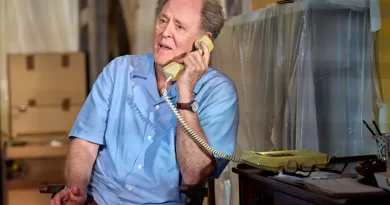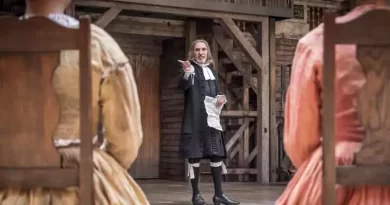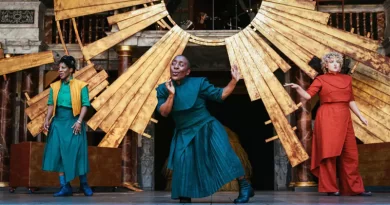“Dealer’s Choice” at Donmar Warehouse
Neil Dowden in the West End
2 May 2025
Patrick Marber’s award-winning debut play Dealer’s Choice explores the tensions between a group of six men playing late-night weekly poker in the basement of a restaurant. As a former gambling addict himself when a student, Marber writes with conviction about the highs and lows of compulsion. This thirtieth anniversary production by Matthew Dunster adeptly channels the testosterone in a dramedy bursting with banter and rivalry, sympathetically portraying the self-destructive characters’ tangled relationships and pipe dreams.

Photo credit: Helen Murray.
Restaurant owner Stephen hosts a Sunday poker “school” for his staff in the basement – but this is a serious game with potentially significant money to be won and lost, not just letting off steam after work. It’s also the only regular time that he sees his estranged, wayward son Carl, who hasn’t wanted to continue working in his business and has accumulated large gambling debts. In particular, four grand owing to his poker mentor Ash, a professional gambler who arrives at the restaurant as an awkwardly late-staying customer but who is invited into the game with only Carl knowing his true identity. It’s payback time.
Also in the group is chef Sweeney, who is persuaded to play against his better judgement when he should be saving his money and having a quiet early night before the next morning taking out his young daughter whom he hasn’t seen for three months. Waiters Mugsy and Frankie have their own far-fetched plans for the future: the former wants a deposit from Stephen to develop public toilets in Mile End Road, East London into his own restaurant; the latter thinks he has what it takes to make it big in the casinos of Las Vegas.
Written at the height of lad culture in the mid-nineties, the all-male environment of Dealer’s Choice is awash with blokeish humour and competitive jibes, some of it tongue-in-cheek but other times with intent to put down. Apart from jokes about Frankie’s girlfriend and brief references to Stephen and Sweeney’s separated partners, there is surprisingly little mention of women and hardly any misogyny. There are outbursts of anger and frustration that a couple of times threaten to overspill into violence amongst these immature, slightly embittered men for whom poker is an escape from a disappointing reality where responsibility is momentarily forgotten. An adrenaline rush that has become an obsession.
The main thrust of the drama is the triangular relations between Carl, Stephen, and Ash, with the latter two vying as dodgy paternal figures over the former. Stephen may have paid off Carl’s debts in the past to keep him out of prison, but he is emotionally distanced from him. As a full-time poker-player, Ash – who himself urgently owes £10,000 to a fellow gambler – may seem a bad influence on Carl, but it is he that ultimately brings home to Stephen that Stephen is the true addict responsible for his son’s going off the rails.
This is the second successful London revival of Dealer’s Choice (following the 2007 Menier Chocolate Factory production), while Marber’s best-known work Closer was also revived at the Donmar in 2015 as well as at Lyric Hammersmith in 2022. After his first few, there have been lengthy gaps between his plays and in the last 10 years he has focused much more on directing with considerable success (winning a Tony Award for Tom Stoppard’s Leopoldstadt). His Menier production of the Mel Brooks musical The Producers transfers to the West End later this year, while at the moment he is directing on Broadway Glengarry Glen Ross by one of his influences, David Mamet – another high-stakes, all-male contest.
Matthew Dunster is definitely the right person to helm this Donmar production of Dealer’s Choice, especially with his experience of directing Harold Pinter and Martin McDonagh (including The Homecoming at the Young Vic and The Pillowman at the Duke of York’s, both in 2023). This entertaining show relishes Marber’s quick-fire wisecracks, without neglecting the latent feelings of the men who reveal their preoccupations indirectly under pressure of the game. Moi Tran’s design switches sensationally after the interval from the working kitchen of a restaurant to an underground poker den with green-baize table centre-stage in a pit, as the restaurant floor is raised up and a staircase descends at the back.
There’s a great ensemble cast. Daniel Lapaine oozes supercilious privilege as the boss Stephen, while also showing occasional surprising flashes of generosity, as a self-deluded gambler who prides himself on rational self-discipline but is actually in the grip of a dependency. Kasper Hilton-Hille suggests in the weak-willed Carl a vulnerable sense of being lost beneath his carefree exterior. Brendan Coyle gives the mysterious Ash the menacing, predatory edge of a man who has no time for amateurs in a cut-throat world. Theo Barklem-Biggs plays the resentful Sweeney who has made a mess of his life, while Alfie Allen is the playboy fantasist Frankie. Hammed Animashaun is endearingly funny as the hapless Mugsy with no head for business, who may always call the toss of a coin wrongly but never gives up hope of being right the next time.









